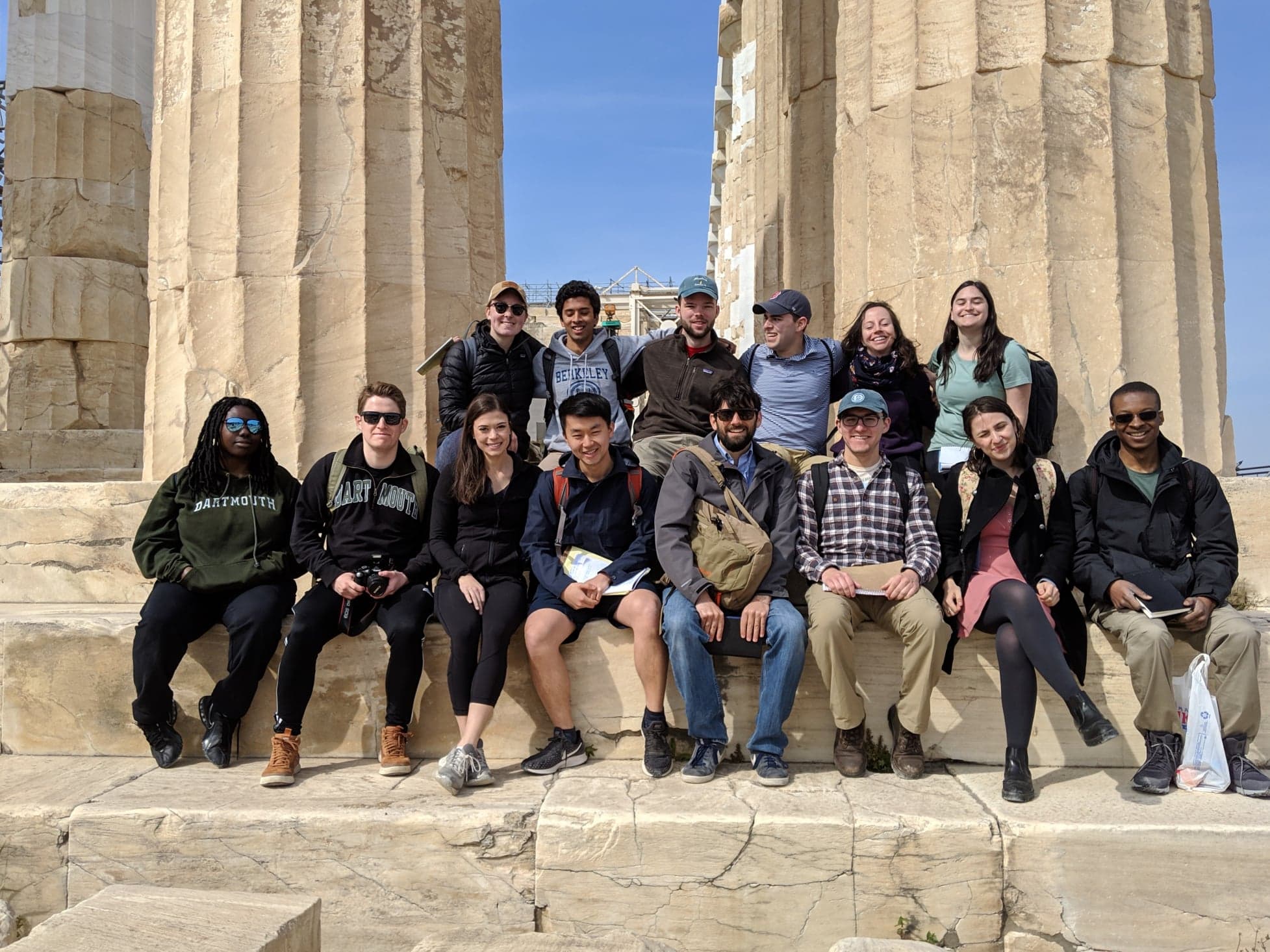Spring 2027
The application period for this program has passed.

The Foreign Study Program in Greece provides students with the once-in-a-lifetime opportunity to learn about ancient Greece by living, traveling, and studying in modern Greece. This FSP will help you become deeply familiar not only with Greece's past, but also with its present, its people, and its landscape. We will spend over half the semester in Athens, where we will live in apartments and take two classes, in English, at a local university. We will spend the rest of the term traveling to study, in person, some of the most famous ancient Greek sites.
If you are interested in this program, please contact Assistant Professor Julie Hruby to talk about the details of the trip and the application process.
How many students participate in the program?
Enrollment is limited to 15 students
How long does the program run?
We arrive in Athens in late March, and the program ends in the first week of June
How do the classes in Athens work?
Dr. Julie Hruby, a member of Dartmouth's Department of Classics, will go to Greece with the FSP group and be there the entire quarter. You will take two courses, with instructors permanently based in Athens; the only students in those classes will be members of the FSP group. During the travel weeks, you will work directly with Dr. Hruby, who will organize and lead the trips.
Do I need to know how to speak (modern) Greek?
No, all classes are conducted in English, and English is widely spoken in Greece. There will, however, be opportunities to learn modern Greek while we are in Athens; learning some modern Greek during the program is encouraged but not required.
Do I need to know how to read Latin or ancient Greek?
No knowledge of ancient Greek or Latin is required.
Do I need to major in Classics in order to participate in the program?
No, typically about half of each FSP group consists of students who are not Classics majors.
What is the (first) application deadline?
1 February 2026
All potential applicants are strongly advised to consult with Assistant Professor Julie Hruby via email well in advance of the application deadline.
About 10-15 students are selected for the program.
For more information about applying for this program, see our webpage on How to Apply & our FAQs under section 2 (How to Apply: Application)
 Julie Hruby Assistant Professor
Julie Hruby Assistant Professor CLST | 30 | 90:
Classical Art and Archaeology
CLST | 30 | 91:
Classical Art and Archaeology
CLST | 31 | 90:
Ancient History
A grade of B- or better in any two of the following courses:
CLST | 6:
Introduction to Classical Archaeology
CLST | 10.17/HUM | 3.09:
Stolen Histories
CLST | 11.02:
Rediscovering Sparta: Ancient Remains and Modern Technology
CLST | 11.17:
Ancient Greek Athletics
CLST | 12.02:
Greek and Roman Engineering and Technology
CLST | 14:
Greek History: Archaic and Classical Greece
CLST | 15:
Alexander the Great and the Macedonian Kings
CLST | 20:
Greek Archaeology: First Hominins to Mycenaean Palaces
In Athens, apartments will be arranged for the group. While traveling, students typically stay in small hotels. Students are responsible for their own meals.
For more information, please see the department website.
We encourage students to engage with their SAS advisors and program faculty/staff during the exploratory, pre-application phase to discuss how disability-related accommodations and access needs can be supported in an off-campus environment. If you currently have approved accommodations at Hanover, SAS will review them to determine which can be provided at your off-campus location and what alternatives may be needed. On-campus and off-campus accommodations may differ depending on each program location's resources and accessibility features. We recommend beginning this discussion with SAS as soon as you are accepted and no later than at least one whole quarter before your program start date.
For next steps, review the Off-Campus Program Accommodations page on the SAS website.
The fees charged by the College for a Dartmouth-sponsored off-campus term of study include regular tuition charges for a term at Dartmouth, service fees, as well as the specific costs established for each off-campus study locale. In many programs, the room and board costs tend to be higher than for a term in Hanover. You can view a budget sheet for each program by clicking on the appropriate term under "Financing Your Program". The cost of transportation to and from the site is the responsibility of the student.
In order that all qualified Dartmouth undergraduate students may have the opportunity to take part in off-campus programs, the College endeavors to adjust its normal financial aid awards for students already receiving aid. Tuition and expected family contribution for Dartmouth's off-campus programs are the same as for an on-campus term.
All costs, including airfare and spending money, are considered when determining the cost of an off-campus program. Any costs more than a typical term in Hanover are met with additional Dartmouth Scholarship Funds. If you have a work expectation for the term, this will be replaced by scholarship funding for programs that span the entire term.
Students are responsible for purchasing their own plane tickets and, in many cases, meals. Often, families find that they owe less for billable items for study away terms but will instead use more of their expected family contribution towards indirect costs such as the flight and meals. For help sorting out who pays what and how, contacting the Financial Aid office is often advisable.
Financing your program | Financial Aid | Scholarships | Budgeting & Costs